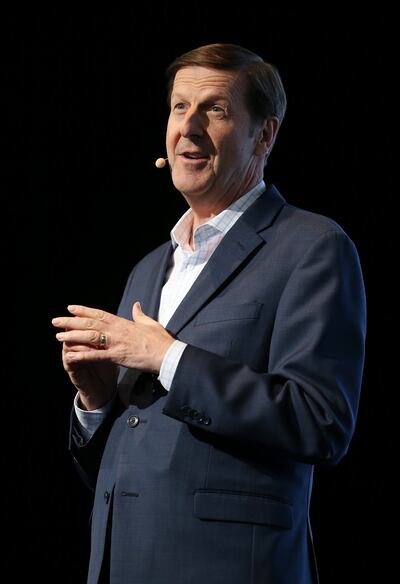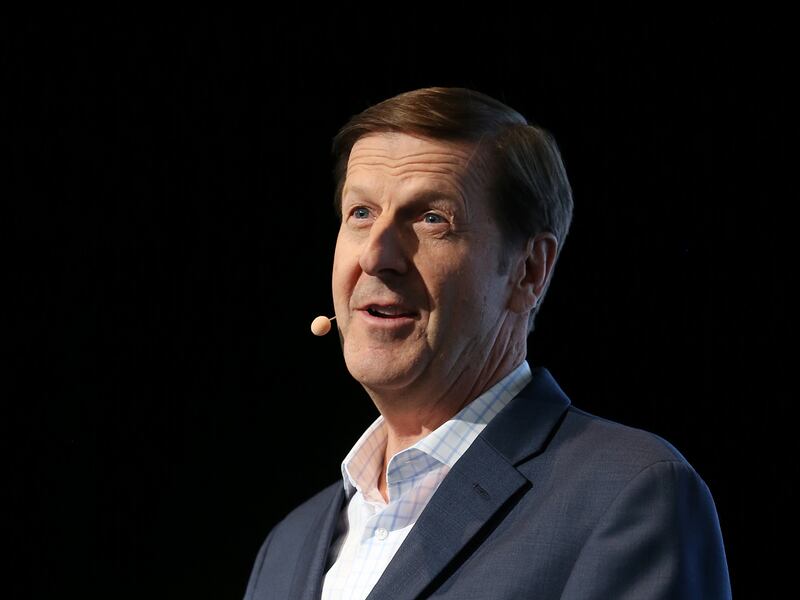SALT LAKE CITY — It was business — not a passion for family history — that led Steve Rockwood to FamilySearch.
More than a decade before he was named the CEO of The Church of Jesus Christ of Latter-day Saints' global genealogy website, Rockwood managed his own company in Colorado. He was hired to lend his abilities to a project for the church and in the process was "smitten," Rockwood said.
"I didn’t come to FamilySearch as a family historian at all. But I got smitten by the cause," Rockwood said. "You get smitten by the cause primarily when you discover what this means to other people."
The events that led Rockwood to FamilySearch were among the topics he discussed in an interview with the Deseret News Thursday at RootsTech, a large family history conference happening this week at the Salt Palace. Rockwood also discussed what goes into planning the massive event, trends in the industry, and the future direction of FamilySearch. It has been edited for length and clarity.
Deseret News: You succeeded Dennis Brimhall as CEO of FamilySearch in 2015. What is the most valuable thing you have learned since then about the family history/genealogy industry?
Steve Rockwood: Dennis put us on such a great path to show how family history helps with much more than just genealogy and how it can be applied to every aspect of someone’s life. What we’ve been doing since then is how universal it is. That literally, these emotions, the spirit of family history is universal. It doesn’t matter where we are. It doesn’t matter what culture. It doesn’t matter what part of the world. You connect someone to their family, or to their homeland, and it is universally felt. It doesn’t surprise us, but it’s very confirming that it’s that universal. That learning now is the basis of how else then can we help people feel those emotions without going with the banner of family history? Let’s go with the banner of discovery, connecting and belonging and gathering. I’d say that is the most powerful thing we’ve learned.
DN: Elder Bradley D. Foster, an LDS General Authority Seventy and the executive director of the Family History Department, mentioned one interesting trend where FamilySearch has seen more general public users/subscribers yearly than Latter-day Saints. Does that surprise you, and how is that benefitting FamilySearch?
SR: It doesn’t surprise us because President Wilford Woodruff (fourth president of the LDS Church), when he dedicated the Salt Lake Temple, asked Heavenly Father to bless those who were not of the covenant, that they would also want to gather their families and help those who were of the covenant. We’re just seeing a manifestation of that in many different ways. The fact that there are organizations like our many partners, that are not of our faith, that are pioneering and leading out in the industry. And then the fact that there are individuals like those who aren’t members of the church but do have FamilySearch accounts is a manifestation of that.
At FamilySearch, we have this unique situation where we realize that all of this is part of Heavenly Father’s plan, all of this is the gathering. We’re just here to make sure that we understand how those people who are being inspired in and out of the church can help with the gathering, and is there anything we can do to connect them and to funnel that to the ultimate gathering that is going on.
DN: As the biggest family history conference in the world, this event involves many months of planning, a rigorous process to get keynote speakers, organizing schedules and coordinating with hundreds of volunteers. What is the biggest challenge in planning and making RootsTech come together?
SR: That’s a great question. Because this is so universal and it’s being discovered by so many people, we want to make sure that those who take an effort to come in person have a wonderful, wonderful experience. And you are always walking the fine line of too many people versus too few people. So it’s accommodating people here.

Then the wonderful — I wouldn’t call it a challenge, but an opportunity — to then share this with those who can’t come to the conference. And thus the online streaming and the recordings that people can access 365 days of the year, that’s where the real return on all of our time and investment comes. So those that do come in person and those that don’t have the same feeling and same experience ultimately. We don’t have to sell RootsTech to our presenters or to the exhibitors at all. They understand and they feel this, so we just accommodate more than sell, if that make sense.
DN: Can you recall the moment or experience when you first realized you had a passion for family history? What was your first "discover" experience?
SR: That’s a great question. I was in industry. The FamilySearch and Family History Department discovered what I was doing with my own company, and thought that what I was doing might apply to what they were doing when they were getting ready to launch FamilySearch into many different languages. So I didn’t come to FamilySearch as a family historian at all. But I got smitten by the cause. You get smitten by the cause primarily when you discover what this means to other people.
I think the No. 1 thing is when I saw, and this was in 2009 and then in 2011, what it could mean to young people. When Elder (David A.) Bednar, in October 2011, called the youth to action, I had a little part in seeing that occur when I was in the field. I think that’s when I said, "OK, I don’t think I’ll be going back into the industry anytime soon if we can make this help the young people, the rising generation." That still is the case today. And we’re seeing that manifested as they grow older. We’re seeing it now with missions and missionaries. They are taking the Spirit of Elijah with them onto their missions. It’s going to enhance missionary work like never before.
It’s going to enhance new convert retention. It’s not a melding of different aspects of the work of salvation, it’s actually all of them becoming one work. But that started when we started looking at what this is really doing for the youth and the young people.
DN: With the new approach to “discover, gather and connect,” where do you see things going in the next few years?
SR: This whole idea of discovering, it’s not new in what people have experienced, but we have been able to title it in such a way that now people will understand what they have been feeling all along. Discovery is the great contagious nature of this. If you could have a small discovery experience that invokes emotion, that’s what is going to spread this, much, much more than duty, and much, much more than a call to action to find a name. Discovery brings the spirit and emotion to it that now I can spread to my family and to friends very easily. And the industry is spreading that.
DNA is changing everything, but not just the science of DNA, because we’ve had the science of DNA here for a long time. It’s that the DNA providers have figured out a way to make that a very emotional experience for people when they connect to their family or their homeland. That discovery experience, along with others, is changing absolutely everything.
I think discovery is going to be the key. And then as President (Henry B.) Eyring taught in his address back in general conference (April 2017 "Gathering the Family of God"), once you’ve discovered these things, you will have this sense, the spirit is going to tell you there is more. And that will lead you to gathering. And gathering is what allows us then to ultimately make sure that spirit can be felt for generations to come, and you have to gather in order to ultimately gather and connect in the temple. I think you are going to see more and more discovery.
When photos and stories brought incredible enthusiasm to this four or five years ago, it was basically discovery. Now photos and stories, DNA and other aspects of discovery, both low-tech and high-tech, that’s what is going to change this whole industry.




